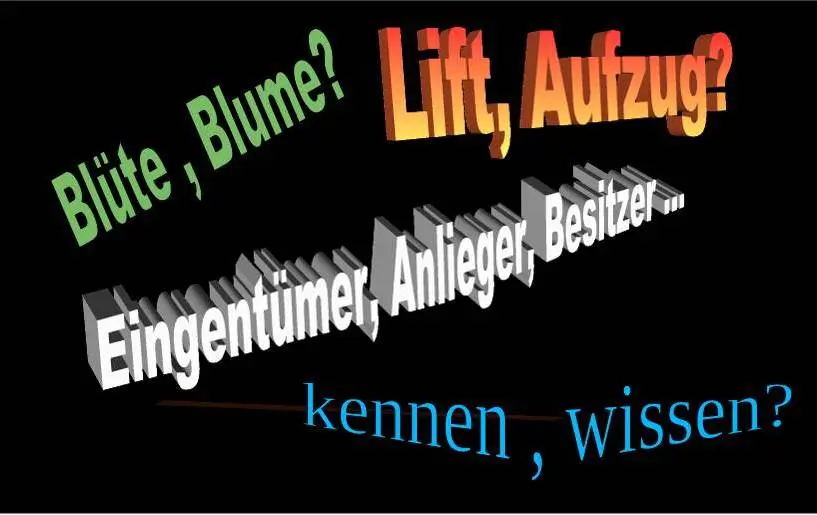We continue our all b1 German speaking topics. In the first part we had numerous topics related to family life and everyday life. Now more compact topics dedicated to medicine, healthy lifestyle, sports, work, shopping, pensioners, etc.
vocabulary
Reach an agreement: vereinbaren vs verabreden, ausmachen etc.
Today we’ll talk about agreements, these will be verbs vereinbaren vs verabreben, ausmachen (abmachen), absprechen vs einigen sich, übereinkommen and nouns Vereinbarung, Verabredung, Abmachung.
Fahrstuhl or Aufzug or Lift
The German dictionary consists of 33 volumes and about 320 thousand words. It took more than a hundred years to compile it, and another 60 years to process it. And this is not surprising, because they have several words for many things. Take for example “lift”: Fahrstuhl or Aufzug or Lift or Paternoster.
Description of a person’s appearance in German. 3. How to avoid repetition in essay
German language, with its very fixed order, requires special attention to repeating of the beginning of a sentence. Here we will look, how to avoid repetition in essay in German. Also, in any essay in any language, it is very important not to repeat verbs. In describing appearance, the verb “to have” is too active. Therefore, let’s explore alternative verbs and constructions.
Describe appearance of a person in German. Body and clothing
We continue to describe appearance of a person in German. In the first part, it was about the head, but the appearance is most often not exhausted by it. We turn to the length and width and other characteristics of the body and clothing.
Describing people’s appearance in German (Personenbeschreibung)
Describing people’s appearance in German is difficult types of essay. You should, firstly, know the appropriate words, and secondly, correlate these words with the appearance of a person. At best, people are able to name eye color, hair color, hair length, and eye/mouth size. It is no less difficult in this type of essay to preserve a variety of sentence structures. It is clear that without training it will be a continuous “he has …”
The first part is about the basic principles of describing people’s appearance in German. An example of possible assessment by the teacher and adjectives for different parts of the head are given.
Separable verbs in German
Separable verbs in German are not so difficult, but they require constant attention, even for those who already speak German well and this makes the rule difficult. In addition to the basic rule, let’s also consider how (in)separable verbs combinations with noun, pronoun, adjective are written (Rad fahren, kennenlernen, leidtun, wieder sehen / wiedersehen, etc.).
Blume vs Blüte
In German, the difference between Blume vs Blüte is somewhat more complicated than the difference between tulip flowers and apple blossoms.
What is the difference besides the presence and absence of an umlaut?
About myself in German – sich vorstellen
About myself in German is the first part of the B1 oral exam. This is a relative simple task that is prepared and memorized at home. However, you should think it through carefully, imagining all the possible questions that can be asked to your text, and compiling answers to them.
Difference between enden and beenden, abschließen, aufhören
We’ve already dealt with the beginning, now the end in turn. We will look for the difference between enden and beenden, aufhören, abschließen.



